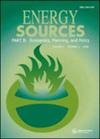China’s climate and energy policy paradox revisited – domestic and international implications of a carbon lock-in ‘with Chinese characteristics’
IF 2.2
4区 工程技术
Q3 ENERGY & FUELS
Energy Sources Part B-Economics Planning and Policy
Pub Date : 2023-02-17
DOI:10.1080/15567249.2023.2166164
引用次数: 2
Abstract
ABSTRACT Juxtaposing China’s current situation and policies toward coal and renewables at home and abroad, we argue that China remains in a paradoxical state of carbon lock-in. We analyze the techno-economic, institutional and political factors that contribute to China’s coal-related policies following a novel approach that blends different theories and frameworks to establish an interdisciplinary dialogue between various strands of research that were hitherto unconnected. This is accomplished by applying a political economy framework through the lens of techno-institutional carbon lock-in theory in three case studies encompassing China itself, as well as China’s climate and energy policy abroad in Pakistan and Mozambique. The article draws four major conclusions about China’s energy paradox: 1) An imperative for economic growth lies at the heart of the Chinese governance system’s incentive structure, which has resulted in a coal-based energy and industrial policy. 2) China’s government should use the experimental, decentralized nature of its regionally-decentralized regime and energy sector to their advantage by promoting disruption rather than incumbency. 3) To address the structural and institutional deficiencies that maintain or even strengthen carbon lock-in, energy governance should be shaped around the primary challenge of strengthening renewable energy advocates throughout all levels of government. 4) The discussion of coal financing abroad must now go beyond the discontinuation of new projects; the building of alternative cleaner projects should be considered and the ones in progress should be halted.中国气候与能源政策悖论再遇——“中国特色”碳锁定的国内与国际影响
本文章由计算机程序翻译,如有差异,请以英文原文为准。
求助全文
约1分钟内获得全文
求助全文
来源期刊

Energy Sources Part B-Economics Planning and Policy
ENERGY & FUELS-
CiteScore
6.80
自引率
12.80%
发文量
42
审稿时长
6-12 weeks
期刊介绍:
12 issues per year
Abstracted and/or indexed in: Applied Science & Technology Index; API Abstracts/Literature; Automatic Subject Index Citation; BIOSIS Previews; Cabell’s Directory of Publishing Opportunities in Economics and Finance; Chemical Abstracts; CSA Aquatic Science & Fisheries Abstracts; CSA Environmental Sciences & Pollution Management Database; CSA Pollution Abstracts; Current Contents/Engineering, Technology & Applied Sciences; Directory of Industry Data Sources; Economic Abstracts; Electrical and Electronics Abstracts; Energy Information Abstracts; Energy Research Abstracts; Engineering Index Monthly; Environmental Abstracts; Environmental Periodicals Bibliography (EPB); International Abstracts in Operations Research; Operations/Research/Management Science Abstracts; Petroleum Abstracts; Physikalische Berichte; and Science Citation Index.
Taylor & Francis make every effort to ensure the accuracy of all the information (the "Content") contained in our publications. However, Taylor & Francis, our agents, and our licensors make no representations or warranties whatsoever as to the accuracy, completeness, or suitability for any purpose of the Content. Any opinions and views expressed in this publication are the opinions and views of the authors, and are not the views of or endorsed by Taylor & Francis. The accuracy of the Content should not be relied upon and should be independently verified with primary sources of information. Taylor & Francis shall not be liable for any losses, actions, claims, proceedings, demands, costs, expenses, damages, and other liabilities whatsoever or howsoever caused arising directly or indirectly in connection with, in relation to, or arising out of the use of the Content. Terms & Conditions of access and use can be found at http://www.tandfonline.com/page/terms-and-conditions .
 求助内容:
求助内容: 应助结果提醒方式:
应助结果提醒方式:


